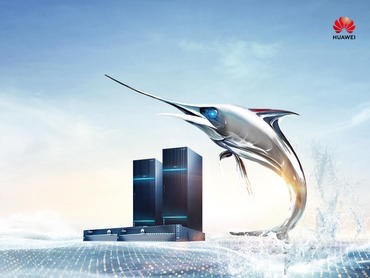[December 19, 2019] It wasn't that long ago that flash storage was something expensive and exotic. Today, flash is the norm, not the exception, in data centres around the world. Indeed, all-flash storage is now moving into mainstream business adoption, thanks to falling prices, greater capacity, and improved software features.
Tellingly, revenues for all-flash storage are close to traditional storage systems now, according to research firm IDC. The share of all-flash storage has even overtaken traditional storage in some regions, as all-flash deployments continue to grow at a fast pace.
As the world's largest manufacturer of all-flash storage, Huawei recently launched the latest OceanStor Dorado, a next-generation intelligent storage solution. The solution sets a new benchmark for all-flash storage. It delivers breakthroughs in the storage architecture with SmartMatrix, integrates five Huawei self-developed intelligent chips, and includes the FlashLink intelligent algorithm to achieve intelligent life-cycle operation and maintenance.
Developed with Huawei's extensive experience with all-flash technology, OceanStor Dorado has enabled the company to be the fastest-growing vendor in the market in order to capture the largest market share.
The writing has been on the wall for traditional high-end storage using hard disks and hybrid media of late. These forms of storage are expected to be replaced around 2018 to 2021, according to a prediction by research firm Gartner back in 2016.
Today, flash has taken on the task of delivering the high-reliability, performance, and availability that organisations expect of high-end storage for mission-critical applications. There is no turning back to old storage media, as organisations shift their infrastructure to cater to their high growth rates.
What is also important is the architecture behind each high-end storage setup. Unfortunately, there has not been many major breakthroughs in this area in recent years.
Products that adopt Scale-Up vertical expansion have high reliability but often limited growth and cannot keep pace with business demands. Solutions based on a dual-controller system with Scale-Out horizontal expansion solve scalability issues but there is a trade-off with reliability.
With architecture currently limited to these approaches, it is virtually impossible to scale effectively while achieving performance, reliability, and cost-effectiveness. What is needed for many of today's businesses, especially ones on a new digital journey, is a transformation of storage architecture. OceanStor Dorado fits the bill here.
Huawei's OceanStor Dorado SmartMatrix architecture combines the best of the Scale-Up and Scale-Out approaches. A single system can include as many as 32 controllers. The unique SmartMatrix with a fully interconnected design at both the front and back-end tolerates seven controller failures without service disruption, setting a new benchmark of storage reliability. In addition, if the controller fails, the system can fail over within one second, and upgrade every second without affecting the host, making this an ideal solution for the finance, manufacturing, and telecom industries that demand 99.9999% service availability.
The breakthrough in SmartMatrix is possible by separating computing from storage, and separating controllers and engines from disk enclosures, while retaining direct connections between them. This means controllers and storage devices can be expanded and upgraded independently to improve the system's flexibility, protect investment, reduce risk, and improve service continuity.
This innovation is possible because Huawei redefined the entire system, from the components to the core chips, as well as the software.
SmartMatrix adopts fully symmetric active-active controller design, and full IP interconnection at the front and back-end, all supporting 100GE RoCE interconnection and end-to-end NVMe. This enables the system to accommodate four 4-socket nodes in a 4U height, implement full switch-free interconnection, and provide 28 I/O interface cards. All interface cards are fully interconnected with the four nodes. Distributed power backup capabilities enable the system to achieve optimal power consumption and performance.
Another pioneering feature of the OceanStor Dorado SmartMatrix architecture is the use of a smart disk enclosure with a built-in processor. This increases the efficiency of everyday processing by taking some of the workload from the controller engine, such as encryption, compression, data verification, disk reconstruction, and fault prediction.
The Huawei OceanStor Dorado uses five self-developed intelligent chips for the multi-protocol interface, processor, artificial intelligence (AI), SSD control, and BMC management. At the same time, the Kunpeng and Ascend processor also boost data processing performance. The five chips are tailored specifically for the storage system to drive a huge leap in the performance of the entire system.
In other words, the OceanStor Dorado from Huawei is a clean redesign for top-end performance and reliability. Adopting a balanced multi-dimensional distributed architecture, it matches the overall hardware architecture to best utilise its software functions.
SmartMatrix is the foundation of OceanStor Dorado, and the architecture's innovation and advancement is set to drive OceanStor Dorado adoption across various industry sectors.

With SmartMatrix at its core, the Huawei OceanStor Dorado includes an array of leading features, which will set a new benchmark for all-flash storage solutions. For example, it is capable of 20 million IOPS and a stable 0.1 ms of latency, delivering the performance needed for real-time services. The SmartMatrix architecture guarantees zero fault impact, zero service impact, and zero upgrade impact. A single system can tolerate a failure of up to seven controllers at the same time, ensuring that services are truly permanently online. AI chips and the AI engine (OceanStor DJ) enable intelligent management throughout the entire lifecycle, including planning, deployment, allocation, O&M, and optimisation.
Through these capabilities, any performance loss on the OceanStor Dorado can be kept within 10% after enabling features such as data reduction and creating snapshots. This is an improvement over the 30% average in the industry.
With all-flash setups clearly the future of enterprise storage, it is not surprising to see that enterprises are seeking a no-compromise solution for workloads, such as databases, virtualisation, and big data analytics.
This is what the Huawei OceanStor Dorado is built for -- a no-compromise system that represents a new direction in all-flash storage systems. It enables a brand-new mindset and real advantages, as the move towards an era of universal all-flash storage gathers pace.